#literary discussion
Explore tagged Tumblr posts
Text
You know what really gets me about all villains is that at one point they were just kids who were so neglected, kids who didn’t understand how to process and make sense of their extreme, traumatic, complex situations … At some point that monster you hate so vehemently was an abused, scared, lonely and confused child, an innocent person— somebody who simply ended up doing their best, doing what they knew how to do — doing something we all could’ve ended up doing, had we grown up with their brain chemistry in their shoes. We all just know what we live, and live what we know. You can’t blame a child for not knowing better. I even argue that you can’t blame adults for not knowing better, if they were never taught, never pulled from the darkness. It doesn’t excuse their actions. I am not justifying that. But this explanation just makes the whole situation so, so, sad.
And if you disagree or agree, or both, you can reblog with your thoughts :) I welcome discussion. But please. Use critical thinking and compassion.
#heroes and villains#villains#good and evil#morality#nuance#complexity#complex situations#literary analysis#literary fiction#book analysis#philosophy#philosophical#moral ambiguity#morals and ethics#morally grey characters#literary discussion#good and bad#story nuance#character analysis#character nuance#jujutsu kaisen#attack on titan#eren yeager#geto suguru#suguru geto#kurapika#dark academia#fandom discussion#jjk#compassion
24 notes
·
View notes
Text
Count of Monte Cristo Thoughts
Page 820 / 1,243 - M. De Villefort as a villain - SPOILERS obv
While there are many clear villains throughout this novel, Villefort, in particular, can be seen to take the forefront, as he was the one who gave the final blow. Danglars orchestrated it, Fernand carried it out, and Villefort threw away the key. Villefort was protecting himself. He was protecting his legacy, his father even, which in part I understand, but he sacrificed a man who, he even acknowledged himself, was so similar to him.
Now, as Villefort is shown presently, his legacy has been secured and he is even more desperate to protect it. To defend himself against the shame he perceived his father's past could bring. This desperation mirrors the exact desperation we saw influence his final decision in locking Dante's away. Although, currently, I am unsure the hand that Dantes is playing in these events, it is interesting to see how Villefort's desperate play for control is what is most likely going to bring about his downfall.
As a villain, he is brilliant. He is the embodiment of selfish fear. Willing to sacrifice anyone. He sacrificed Dantes, he sacrificed Madame Danglars to suffer through the "death" alone, he sacrificed his child who he knew was alive because of what the scandal would mean, and now he is willing to sacrifice his own daughter to cover up a final connection that would scandalize his name. Dumas shows how far Villefort would truly go to protect himself, specifically his legacy as a judge, and how he does not even see the others around him as having thoughts but merely as pawns in his own game. As Villefort states in regards to his own daughter, "I guarantee there will be no objection from that side" (p. 816), which truly shows the way in which he assumes everyone within his power will bend to his will.
It is this selfish intent and the way he desperately fights to keep those around him completely under his control, to do as he seems best and fit, which truly makes Villefort this incredible villain. A villain so easy to hate and whose vices will be his karmic downfall.
6 notes
·
View notes
Text
I cannot fathom how anyone gets "harried and desperate fools" out of the powerful closing sentence "They seem to know where they are going, the ones who walk away from Omelas". That sounds to me like leGuin has a solution in mind, or at least that the characters do. Not a triumph, perhaps, but at any rate a resolution.
"The idea of reforming Omelas is a pleasant idea, to be sure, but it is one that Le Guin herself specifically tells us is not an option. No reform of Omelas is possible — at least, not without destroying Omelas itself:
If the child were brought up into the sunlight out of that vile place, if it were cleaned and fed and comforted, that would be a good thing, indeed; but if it were done, in that day and hour all the prosperity and beauty and delight of Omelas would wither and be destroyed. Those are the terms.
'Those are the terms', indeed. Le Guin’s original story is careful to cast the underlying evil of Omelas as un-addressable — not, as some have suggested, to 'cheat' or create a false dilemma, but as an intentionally insurmountable challenge to the reader. The premise of Omelas feels unfair because it is meant to be unfair. Instead of racing to find a clever solution ('Free the child! Replace it with a robot! Have everyone suffer a little bit instead of one person all at once!'), the reader is forced to consider how they might cope with moral injustice that is so foundational to their very way of life that it cannot be undone. Confronted with the choice to give up your entire way of life or allow someone else to suffer, what do you do? Do you stay and enjoy the fruits of their pain? Or do you reject this devil’s compromise at your own expense, even knowing that it may not even help? And through implication, we are then forced to consider whether we are — at this very moment! — already in exactly this situation. At what cost does our happiness come? And, even more significantly, at whose expense? And what, in fact, can be done? Can anything?
This is the essential and agonizing question that Le Guin poses, and we avoid it at our peril. It’s easy, but thoroughly besides the point, to say — as the narrator of 'The Ones Who Don’t Walk Away' does — that you would simply keep the nice things about Omelas, and work to address the bad. You might as well say that you would solve the trolley problem by putting rockets on the trolley and having it jump over the people tied to the tracks. Le Guin’s challenge is one that can only be resolved by introspection, because the challenge is one levied against the discomforting awareness of our own complicity; to 'reject the premise' is to reject this (all too real) discomfort in favor of empty wish fulfillment. A happy fairytale about the nobility of our imagined efforts against a hypothetical evil profits no one but ourselves (and I would argue that in the long run it robs us as well).
But in addition to being morally evasive, treating Omelas as a puzzle to be solved (or as a piece of straightforward didactic moralism) also flattens the depth of the original story. We are not really meant to understand Le Guin’s 'walking away' as a literal abandonment of a problem, nor as a self-satisfied 'Sounds bad, but I’m outta here', the way Vivier’s response piece or others of its ilk do; rather, it is framed as a rejection of complacency. This is why those who leave are shown not as triumphant heroes, but as harried and desperate fools; hopeless, troubled souls setting forth on a journey that may well be doomed from the start — because isn’t that the fate of most people who set out to fight the injustices they see, and that they cannot help but see once they have been made aware of it? The story is a metaphor, not a math problem, and 'walking away' might just as easily encompass any form of sincere and fully committed struggle against injustice: a lonely, often thankless journey, yet one which is no less essential for its difficulty."
- Kurt Schiller, from "Omelas, Je T'aime." Blood Knife, 8 July 2022.
10K notes
·
View notes
Text
Make sure to add our podcast on podbean and spotify.
#music discussion#politics news#politics#literary discussion#black podcast#podcast#gen z shit#media criticism#come listen
0 notes
Text

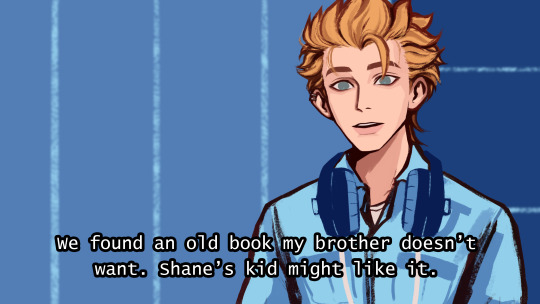
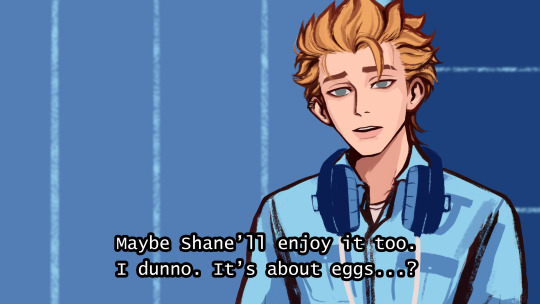
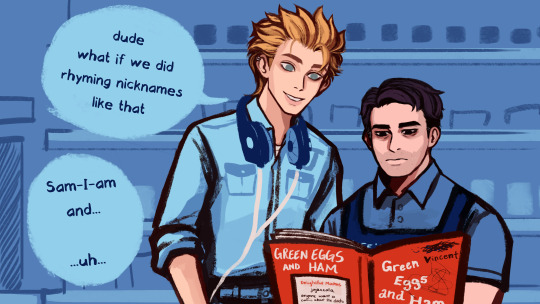

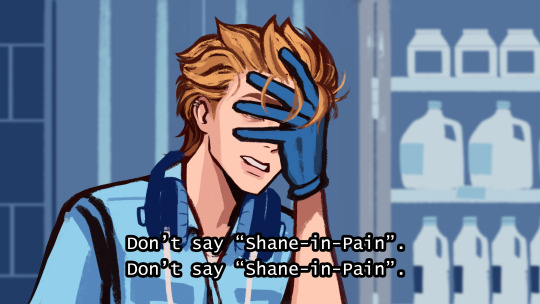
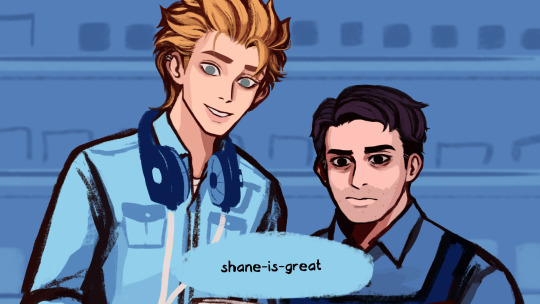


blue eggs
[ jojamart mockumentary #16 ]
[ prev ]
#stardew valley#stardew valley fanart#sdv shane#sdv sam#jojamart mockumentary#my art#this was originally going to be a two-parter#but i ended up condensing it into one entry#inspired by a discussion i had last december about the book green eggs and ham#i realized that if there were any literary parallels that this series could make#it would be with that story
3K notes
·
View notes
Text
But that doesn't refer to depth, but distance travelled! You can swim 20k leagues under the sea if you're good at holding your breath, and that's just as true if the sea is uniformly one fathom deep!
I spent so much of my life romanticizing the Great and Powerful Enormity of the Sea, reading about the salt and the sweat of the sailors straining to haul the sails or anchor while dreading the monsters in the cold, icy deep fathoms below…and now you tell me that a fathom is only 6 feet deep -
66K notes
·
View notes
Text
i’m sure i’m not the first to say something like this, but let me tell you about my poc-passing-as-white jay gatsby headcanon!!
for some background, in the 1920s there was an interesting shift regarding (white) skin tones. previously, tans were viewed as a sign that a person worked out in the fields, and therefore a trademark of the lower class. however, slowly after the industrial revolution, it increasingly became a representation of luxury, since the rich upper class would have the time to lounge about and sunbathe at their leisure.
i say all this to show that a poc gatsby would have the ostensible class and wealth for a tan, which would ‘excuse’ a slightly browner skin tone in the public eye.
(the 20s was also the setting of passing by nella larsen, so that’s neat.)
in my vision, he’s biracial (maybe his mother was black & his father was a german immigrant) with skin light enough to pass for white.
the fact that nick states that gatsby keeps his hair neatly groomed and cut might be to prevent it from curling up.
additionally, i think it could contrast tom’s white supremacy & his fear of poc social progress.
it would also create a deeper divide between gatsby and daisy, and once again the contrast between him and tom. in my mind, daisy wouldn’t know about it until the point where tom reveals everything about gatsby’s bootlegging etc. with jay revealing it to her in the car ride back (oops then she hits myrtle).
then, when she chooses tom and the life of comfort, wealth, status, etc that their marriage offers, she also rejects not only gatsby’s new money but also his race.
it’s a lot more thematically significant for the american dream as well—it’s still unattainable and essentially tainted by capitalism, and it also emphasizes that it’s restricted to the white upper class. social mobility only becomes available to gatsby when he disguises his racial identity.
similarly, it fits with gatsby’s identity reconstruction—the quintessential american is white, rich, and educated.
daisy and tom have that ticket into society because they have that inherent thing that he will never have—pedigree, in both class and race. that’s something that even nick has.
(in my mind, he tells nick all about it the night before he dies & nick understands as best he can and doesn’t think less of him, because it further highlights the differences between his & gatsby’s relationship v. gatsby’s relationship with daisy; namely, the transparency -> acceptance give-and-take that he and daisy never had. because of having to hide himself from daisy in order to maintain her affection, he builds an expectation that he must be someone that he is not as well as developing a transactional definition of love (he gives, and people love him as long as he can continue to give) in order to be loved. therefore, nick’s immediate curiosity and fascination with who he truly is is foreign to him. not to get too into their dynamic lmao i just think it’s really interesting.)
finally, the very last part where nick is sitting and looking at the bay and thinking about the first immigrants and their dreams and how gatsby embodied the purity and naivety of those dreams is further exemplified by his racial ‘otherness.’
and there’s,,, technically nothing in the book to explicitly refute this from what i remember!
(n.b.: it has been a hot second since i’ve read tgg, so lmk if i’ve got anything wrong!)
#the great gatsby#f scott fitzgerald#jay gatsby#nick carraway#daisy buchanan#tom buchanan#natsby#1920s#poc gatsby#poc representation#headcanon#passing#american dream#american literature#analysis#literary analysis#tgg#long post#discussion of race#val talks
716 notes
·
View notes
Text
Satoru and Suguru Analysis - In Depth
unedited, unfinished (I’ll likely add on more and repost this)
Why Gojo and Geto could connect despite Gojo’s life of isolation
What the two meant to each other
What could’ve been
Based on This Ask. (Anon asked me if they thought Gojo told Geto “koishiteru” before killing him.)
I’m not a native Japanese person, but I am half Japanese. From what I know, “koishiteru” (恋してる) is usually said when you’re falling in love with somebody, and you have those strong romantic/excited feelings towards them. Gojo hadn’t seen Geto in many years (besides when Geto invaded Jujutsu Tech), and their ideals and paths had diverged significantly since the last time they’d interacted, so for this particular timeline, no, I don’t think that Gojo said “koishiteru” to Geto. In fact, Gojo was angry at Geto for endangering his students, the youth, as we see when Gojo says, “I thought we agreed we wouldn’t hurt the youth.” It’s clear that Gojo’s ideals and beliefs are clashing with Geto’s actions, during that reconnection scene. People usually don’t fall for somebody who isn’t somebody they deeply admire (whose convictions and beliefs you can resonate with). So prior to Geto’s death, I think that Gojo wasn’t in love with Geto, but Gojo did express that he still felt affection for Geto, and I will explain below.
Despite Geto’s defection all those years ago, and despite his actions before his death, Gojo still had feelings alike affection and love for Geto. The two understood one another in a way nobody else did: they were high school best friends who were the strongest, two teenagers who had given up their life in order to protect and serve others. Gojo never knew a life outside of being a weapon. And Geto understood the world that Gojo grew up in, lived in, fought in, fought for— and the two laughed together, too. They were comrades. Geto was Gojo’s first and only deep connection, for a long, long time. Geto was the closest to an equal that Gojo would ever have. There’s no doubt that Gojo still considered Geto his best friend (Gojo said so, himself), but going so far as saying “koishiteru” is… not making sense to me.
The two were undoubtedly still important to one another before Gojo ended Geto, but their own different missions were more important to them than one another (that’s why they had split). That doesn’t mean the two still didn’t hold a special place in their hearts for the bond they shared with one another, but it does make me believe that Gojo and Geto couldn’t have been lovers in that they never got the chance to be romantically involved. Gojo called Geto his “best friend” rather than his lover, as well. It’s possible that Gojo could have developed romantic feelings for Geto over time, if they’d spent more time together and both swung that way. But they didn’t have the proper time and space to grow closer to one another in a way that went beyond best friends. Them being lovers would’ve had to have been in another life.
Main points: what Gojo and Geto had was real, it was best friendship, it was connection (hit all the boxes that allowed Gojo, the isolated king, to actually connect to somebody else). Geto was possibly Gojo’s only deep connection that he’d ever experienced— but their ideals pushed them apart. They still hold a special affection for the bond they shared, a special affection for one another, but they’re not puppy love obsessed with one another, nor are they bound together anymore by convictions. Whether or not that means they’re just tragic best friends, lost potential lovers, who can say for sure? No one, except Gege. And Gege did confirm they were just best friends. So I think my take is nuanced AND on par with what Gege was thinking.
Philosophy take away: You might love somebody with all your heart, but there can still be a world of distance between the two of you, if your convictions and beliefs diverge. It’s… something.
Other Anime Character Analysis’ Here
#satosugu#jujutsu kaisen#discussion#literary analysis#JJK#character analysis#jujutsu kaisen thoughts#philosophy#academia#JJK theory#jjk fanfiction#jjk fanfic#gojo satoru#geto suguru#suguru geto#satoru gojo#jujutsu kaisen discussion#jjk fanart#JJK analysis#JJK philosophy#jjk fandom#jjk gojo#JJK geto
41 notes
·
View notes
Text
The Secret History and Queer Theory
The male characters' relationships with eachother in The Secret History relate to Queer Theory through their actions and participation in the bacchanalia, bar Richard since he was not invited to that ritual. In the novel, the only openly queer character is Francis, who sleeps with Charles whenever Charles is drunk enough to be open to it, kisses Richard, and kisses Camilla, the only female in the class. When discussing the bacchanalia with Richard, Henry deflects from prodding that part of the ritual is sexual and tends to have orgies; this hints that during the night in the woods, Henry, Charles, Camilla, and Francis slept together. Richard also accidentally stumbles upon a moment between Henry and their professor, Julian, when they share a short kiss, which seems to mirror the intense relationships between male teachers and their pupils in ancient Greece. Richard’s sexuality can also be questioned since, although he pines after Camilla, he gives a lot more vivid details of the appearances and personalities of his male peers and seems to obsess over Henry. In the book, Richard adores Camilla, who looks androgynous and is like her brother. When he and Francis kiss, they stop because Charles shows up in Richards's room.
Queer Theory relates best to this novel because the characters tend not to follow the heteronormative ways of Western society. At one point or another in the story, the boys seemingly sleep with or kiss each other, and we see Richard being more observant of the other's looks than what would be considered “normal.” Gender studies would also work by breaking down how The Greek students fit their respective gender roles in society. Henry, for example, is described as tall, handsome, and strong but also has a temper. In contrast, Camilla is seen as androgynous yet still dainty and intelligent. Near the novel's end, Camilla takes on the caretaker role for her elderly aunts once she leaves Hampton.
Throughout my first reading of the novel, I noticed so many moments that did not seem heteronormative and how they seemed to mirror parts of ancient Greek society—those moments to me added humanity to people who otherwise were held up on a pedestal by Richard. Although the sexuality of the characters is never stated, bar Francis, it shows a depth to each character that they may not be entirely one sexuality or another. The Greek students, besides Bunny, seemed to see themselves as people or gods from ancient Greece, or at least, they wished to be like them.
#the secret history#book discussion#queer theory#richard papen#francis abernathy#charles macaulay#camilla macaulay#henry winter#personal take#dark academia#donna tartt#literary theory
28 notes
·
View notes
Text
Ngl, seeing Maki haters/Toji stans bitch how Maki is a bad character or that she's only a "Toji copy" is the funniest shit ever. Y'know why? Because they literally got slandered by Gege as a character.

That's right. This motherfucker. He quite literally is what those Maki haters are- or what he symbolizes. And it's funny how they always bitch about Maki or that she's just a "copy" when...look at Naoya. Look how he ended up. Look at how stupid he was portrayed. Look how she DOMINATED him. Look how dumb he looked narrative wise.
Also...when do parallels mean a bad character or a "copy?" What cause Maki's a girl? That's stupid. If she were a copy she wouldn't have been created by Gege before Toji in JJK 0. Or have her dynamic with Yuta, or those moments of her struggling to accept affection, or have all that development, or her dynamic with Mai, or her symbolism.
Conclusion: Naoya and toxic Toji stans are mainly wannabe sigma toxic male 14 year old boys who can't even get a snickers from their mommy lmao. They're also the fans who were LITERALLY slandered by Gege in the form of a character.
#didnt want to bitch more about jjk fandumb but this god forsaken fandom is so stupid i have to#some also got salty on my tiktoks and im tired of dealing with maki haters bs so im making this#meta#my meta#jujutsu kaisen#jjk#jujustu kaisen manga#jjk manga#jujutsu kaisen analysis#jjk analysis#maki#maki zenin#zenin maki#toji#toji fushiguro#zenin clan#mai zenin#zenin mai#naoya zenin#naoya slander#pro maki zenin#maki zenin defense squad#pro maki#anime#analysis#media literacy#discussion#character analysis#media analysis#literary analysis
86 notes
·
View notes
Text
Warning: Discussion of SA in literature.
I made a post last January, essentially mourning the downfall of one of my favourite authors, rotXinXpieces aka Rotty and compared it to the grief I felt when I lost my respect for JK Rowling when I found out she was a TERF.
I have spent the last year distancing myself from his fandom, while slowly slipping into the role of a silent reader, reading the books in hopes that they would improve over time and in hindsight of the stir and chaos my post caused in said fandom. I want to point that the post garnered a fair bit of attention as well as a fair bit of abuse, both because I dared to criticize the books, and the author's literary choices, but also, because I made the grave error of badly wording the comparison of my grief over losing respect for JK Rowling to losing my respect for Rotty. I have since edited it to read better and included an apology to Rotty and my trans siblings, because I truly never meant to compare a trans author to a TERF of all people, that is unimaginable to me.
With that said, I would like to point out that my criticisms were shoved aside and to the back while this poor choice of wording on my part took center stage in this arena of hatred that was being hurled at me by the fandom. I found that certain fans manipulated this particular mistake to draw attention away from the majority of the criticisms I made. I stand by my post and I have not deleted it, because it is the truth. It has been over a year since then and I find this happening all over again, and I don't think people realise what has actually happened in the last week, or the last month if we really want to go back.
There was a post made on Rotty's message board once again by a fan, I will not name them here, but the post and subsequent supportive comments criticised Rotty, and basically called him out for the gross overuse of SA in the books, the lack of resolution, the lack of repercussions for the r*pists and justice for the victims.They pointed out that the overuse of SA was starting to look like a sick fetish on the author's part, where the author was vicariously living out a fantasy via their books and the readers were their unsuspecting victims. Rotty acknowledged the post and promised to do better, citing his own traumas and how he was drawing from them.
He did not do better, Recently, he posted another chapter in his book Broken, whose protagonist Three’s love interest Tricho began toeing the line into SA territory, which then immediately led to another post being made on the message board by a reader, asking if we could please not have any more SA and that it was getting really exhausting. They further stated that they loved the books but that they were disappointed that the series was declining rapidly. They mirrored the previous post, saying that the blatant overuse of SA was starting to look like a fetish and that they felt that they were being forced to engage in it without their consent, with some commenters supporting them with similar messages and a few comments with unsavory language.
(Screenshot of the post below:)

Another post was made immediately after, stating that if people thought the SA in the series was *not so bad* that they should check out the following list. The list consisted of the books named in chronological order with the names of the characters that were SA’ed to some degree or the other or in some way adjacent.
(Screenshot of the list below:)

Rotty reacted to this by saying that he would take down the books and fix this. Following which, he did so without so much as warning the fans, which then led to a weekend long of hatred, anger and bullying.
The whiteknights defending Rotty attacked a server from which a few members had commented on the post, and the person that posted the list. But this post is not about a war between two rival servers of the same fandom. This post is about how once again, the criticisms were being brushed aside in favour of the few comments with unsavory language. This post is about how an author needs to take social accountability for the books he writes and publishes. If you look at that list, and you see 22 out of 30 books have SA in them, of which the 30th was still ongoing, and you feel offended for any other reason than how appalling that is, how jarring it is to see and know this is the series you have been following and loved for so long, then you need to look within yourself and think about why that list offends you.
Over this last week I've heard people say that SA is prevalent throughout Greek mythology, that they've forgiven their assaulter, that people have to face their assaulters on a regular basis, and to this I say:
(Screenshot of the two comments below:)


Yes, SA has been common throughout history and mythology, when such abusers were often in a position of power and the victims had little to no way of fighting back and / or seeking justice, if this series is set in a modern universe, which relatively it is, then this should imply that these characters should be held to modern standards of justice and equality, it may not be same in terms of punishment, but it should be in terms of accountability. If a politician or priest is or should be held responsible and punished, then so should these characters.
Granting one's abuser forgiveness is a personal choice, but the implication that forgiveness is perfectly normal or expected is a gross invalidation of a victim's experiences, especially when such experiences often leave behind continuous and deeply painful trauma.
On another note, yes, some people do have to face their assaulters on a regular basis, but that should not be the case and it definitely should not be expected of victims, especially when–
1) The victim has stated or displayed in the past the refusal or inability to be in the vicinity or presence of their assaulter, especially if the contact is unnecessary and avoidable. Sunday lunches for pleasure are not necessary and completely avoidable.
2) Familial relations do not mean a victim owes their assaulter anything, not lunch on sundays, not forgiveness, nor kindness in the face of centuries long of abuse and humiliation, simply because the author decided to give the assaulter a redemption arc, and I use the term redemption arc very loosely here, sarcastically even.
Now, before you hit me with the “An author can write whatever he wants to” and “If you don't like it, just don't read it” or “SA is normal, he's (Rotty's) drawing from his own experiences”, I would like to point out that yes, an author can write whatever he wants, but you cannot say this about works published online for free, on a website like Wattpad, where the books are not being regulated as well as you think and hope they are, and are available to readers as young 12 and 14, whereas when books are published through a publisher, they go through a set of checks and balances in the form of editors and beta readers. This is their social responsibility.
The “don't like, don't read” argument works for fanfiction on Ao3, where there are warning tags, or a book genre where the readers know what they are getting into, like Horror or Dark Fantasy, albeit which come with content and trigger warnings. You cannot say this to fans that love and have loved this book series for a decade, maybe longer, despite everything, when they only hate the gross overuse of SA and how inconsequential and poorly addressed it is, if at all.
SA is a real life issue and an unfortunate fact of life. It deeply saddens me that many people go through this trauma on a daily basis and it breaks my heart that Rotty has gone through this. However, SA should not be normalised, even if the author is drawing from his own experiences, when it is being portrayed to the extent that it is, with little to no justice for the characters, or accountability for the assaulters. SA is not a plot device, or a trope to be used in place as an excuse for lazy writing.
Young minds are susceptible to repeated exposure to such sensitive and graphic topics. These books are being read by pre- teen and teenagers, this will potentially lead to them normalising or even romanticising SA and not even realising it is wrong or bad, these young minds could grow into people that may fall victim to SA, because it has been normalised, or worse, become predators themselves. While victims of SA may read these books as a way to cope with their trauma, others might find it traumatizing or even be angered by the lack of justice for victims and the lack of repercussions for assaulters. And no, the slap on the wrist does not count, not while the character lives seemingly happy ever after with the one of most powerful characters of that world as their lover.
We need to stop sending messages that normalise marrying your abuser, or that dating your best friend's lover's assaulter is alright. We do not need to further fester the wound on society that is SA, by normalising them in books to the extent that they have been. This is why social accountability is important.
Yes, these books are fictional, the characters in them are not real, but their experiences are drawn from a lived reality for many. We live in a world where the SA of women is treated with outrage and demands of justice, where SA is SA whether you are a man, woman or child, whether you are straight, gay, or trans. Would these books be distasteful if the characters that have been repeatedly and brutally assaulted were women instead of men? Or would it just be normal?
As readers, we need to hold our authors to account, but that is useless if the criticisms of the art are treated like an attack upon the artist. When the author shields himself behind accusations of cyberbullying to hide his behaviour and lack of social accountability, it is those handful fans that stand up to him and his massive fanbase that are treated like lambs for slaughter, knowing full well that they are walking into a colosseum of hatred, like the gladiators of ancient Rome.
#Warning: Discussion of SA#official rotty army#rotXinXpieces#literary criticism#LGBT+ literature#fandom#social accountability#SA is not a plot device#the underworld chronicles#wattpad
29 notes
·
View notes
Note
bbg i’m sure you’re already aware, but i don’t think it’s okay to ship siblings especially TWINS
not having discourse with you guys until you read "Gothic incest: Gender, sexuality and transgression" by Jenny DiPlacidi (jstor) and come prepared to critically examine how the merging of erotic/familial love in gothic literature has historically been used to disrupt the gendered boundaries that define the genre....
we're being so scholarly about this one. match my freak.
#a#i love how the framing of this ask suggests that sibling incest is like. somehow uniquely worse when it's twins. anon explain#i could type up a big defense but just like. if i touch on “dead dove” topics trust that i am trying to be tactful & academic about it#i've always read pureblood culture as gothic from day 1 on here! and that means murder/incest/gendered violence is woven into the text!#+ there are ways to discuss and be interested in “dark” thematics while also being respectful. ppl do this every day in uni classrooms.#and its like fundamental to literary criticism i feel... don't be scared... take my hand.... we did necro evan & now we're doing this....#I KNOW I WAS BEING FLIPPANT EARLIER LMFAO BUT YOU HAVE TO TRUST...
62 notes
·
View notes
Text
bf paused the podcast after quincey’s entrance to say ‘the country music plays whenever he enters a room. it’s diegetic’
#we have very serious literary discussions. like giggling when seward talked about quincey’s manhood#re: dracula#dracula daily
50 notes
·
View notes
Text
WC Fandom Callout/Hot Take Time!
(I would like to preface this by saying that I am a member of the Warrior Cats community myself; I love it here and there are so many amazing and talented people. This post is by no means saying that everybody here is guilty of this, nor is it meant to be an attack or show of ill will on those who are. <:])
Okay, so I have a small grievance to air:
Never, in all my years on the internet, have I ever seen a community that matches the sheer amount of negativity and petty spite the WC fandom has, especially towards its own creators.
Exhibit A:
WC fandom:
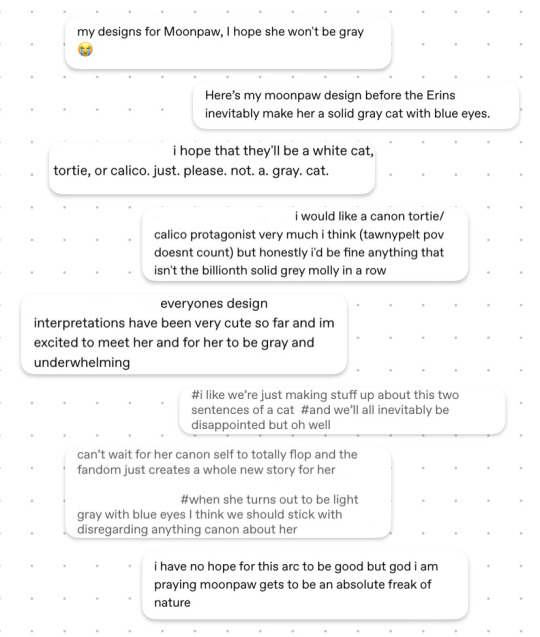
The Erins: *actually give us the most pretty, fun, and unique canon design we’ve ever gotten, which CLEARLY IS A CHIMERA AS THEY INTENDED DUE TO HOW HER BLACK FUR IS LONGER THAN HER ORANGE FUR (LOOK AT HER CHEEK FLUFF)*
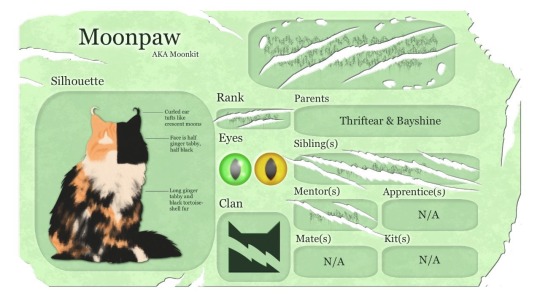
WC Fandom:
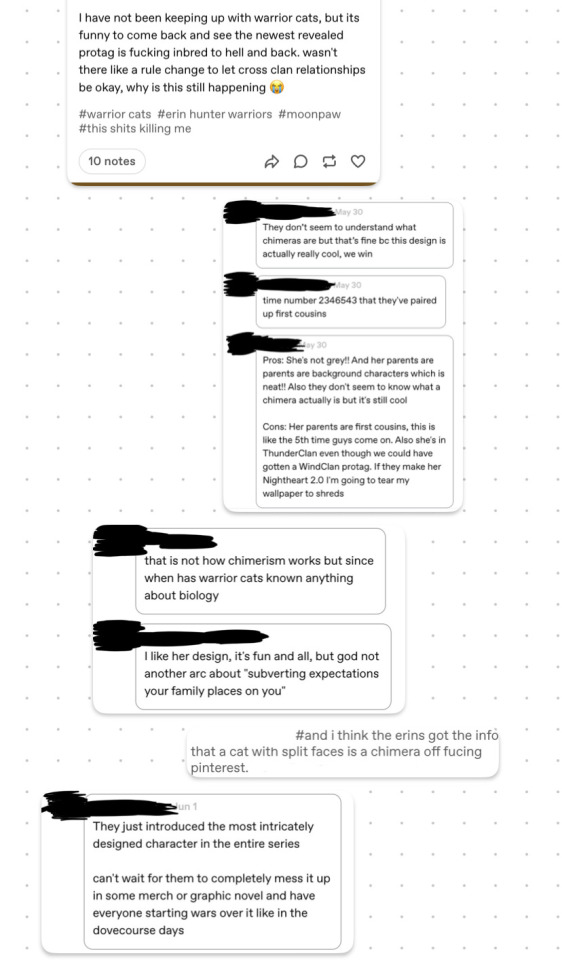
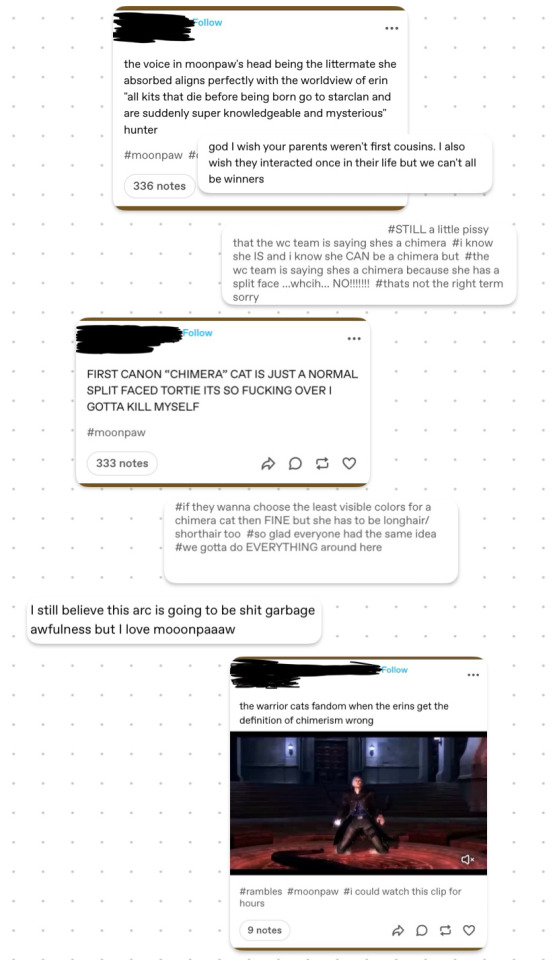
LIKE. Y’ALL.
(I would also like to mention that while yes, the inbreeding is gross and warrants criticism, when you have such isolated populations interbreeding, it was always bound to happen, especially with such complex and forgettable lineages (of feral cats, no less (y’know, animals that form family trees like that naturally?)). Honestly? It’s been an issue for so long that I really think we should just stop pointlessly whining about it, accept it (as long as they aren’t too closely related/it isn’t immediate family incest), and move on.)
I get constructive criticism and civil discourse is healthy in a fandom, but there’s no need to be so blatantly and endlessly petty and spiteful, especially towards the people who try so hard to give you the thing you enjoy in a consistent and timely manner and live up to its legacy. I agree that there are definitely things they’ve messed up on or could do much better with and that they should prioritize quality over quantity more, but c’mon. Honestly, y’all will just find anything to bitch about. 😭 Besides, enough with the pessimism and belittlement! Fandoms are supposed to be fun, and trust me, you will have much more fun if you just let yourself be excited and see what happens. Even if it does feel somewhat like toxic positivity to say so, there's no joy in just being a critic all the time. :]
Anyway, sorry for the exasperated ramble, and thank you for coming to my TEDtalk. 🙏
#i don’t mean to be rude but seriously#there is no winning with y’all#warrior cats#wc#warriors#warriors fandom#wc fandom#erin hunter warriors#erin hunter#hot take#call out post#fandom#fandom discourse#fandom drama#fandom hate#fandom discussion#fandom hypocrisy#civil discourse#discourse#literary criticism#media criticism#fandom critique#fandom criticism#constructive criticism
86 notes
·
View notes
Text
The reason you care is that you care about the poet, and what they want to say.
I... don't think this is true? I mean, of poetry enjoyers; I suppose it might be true of the average poetry encounterer. But taking an example at random, I will definitely read this for the words and not the message:
They christened my brother of old—
And a saintly name he bears—
They gave him his place to hold
At the head of the belfry-stairs,
Where the minster-towers stand
And the breeding kestrels cry.
Would I change with my brother a league inland?
(Shoal! ’Ware shoal!) Not I !
And I have, in fact, sat down with a complete volume of Kipling's poetry and, like, read it. But I suppose your point is that it would be hard to get any large N of weirdos like me for a Turing test, and this is going to be true of any moderately-obscure art.
Final pet-peeve note:
whose vision you want to pour over
It's 'pore' over, etymology uncertain but possibly related to "purblind", ie nearsighted from too much "poring over" manuscripts in poor light. You pour water over flowers.
There are two big "AI Art Discourse" events of note recently, which I thought were interesting: ACX's "AI Art Turing Test" and the new paper on "AI Poetry Beating Human Poetry". Both of these I think reveal the shape of "what is AI art for", and also say a lot about how these results were utilized in discourse.
To take the latter first, some academics quizzed people on some poetry and had these results:
We found that AI-generated poems were rated more favorably in qualities such as rhythm and beauty, and that this contributed to their mistaken identification as human-authored. Our findings suggest that participants employed shared yet flawed heuristics to differentiate AI from human poetry: the simplicity of AI-generated poems may be easier for non-experts to understand, leading them to prefer AI-generated poetry and misinterpret the complexity of human poems as incoherence generated by AI.
More human than human poems! This certainly seems impressive - and it is. You couldn't have gotten these results ~5 years ago. But that maybe doesn't mean as much as you might think? Because here is the opening half of the winning "Walt Whitman AI" Poem:
I hear the call of nature, the rustling of the trees, The whisper of the river, the buzzing of the bees, The chirping of the songbirds, and the howling of the wind, All woven into a symphony, that never seems to end. I feel the pulse of life, the beating of my heart, The rhythm of my breathing, the soul's eternal art, The passion of my being, that burns with fervent fire, The urge to live, to love, to strive, to reach up higher. I see the beauty all around, the glory of the earth, The majesty of mountains, the miracles of birth, The wonder of the cosmos, the mysteries of the stars, The poetry of existence, that echoes near and far
This fucking sucks. Straight up 2/10 poem. Did this bitch seriously establish the world's most predictable rhyme scheme only to try to rhyme wind with end? You had one job that you chose for yourself, and you screwed it up! This poem has been written a million times before, and says nothing - the Miley Cyrus lyrics of verse.
The reason this won is, yes, because AI tools have advanced heavily in the past few years. But it is also because it is being tested on a dead art. No one cares about poetry - certainly not the survey respondents:
We asked participants several questions to gauge their experience with poetry, including how much they like poetry, how frequently they read poetry, and their level of familiarity with their assigned poet. Overall, our participants reported a low level of experience with poetry: 90.4% of participants reported that they read poetry a few times per year or less, 55.8% described themselves as “not very familiar with poetry”, and 66.8% describe themselves as “not familiar at all” with their assigned poet.
"Or less" is doing a LOT of work there; "yeah I read a few nonfiction books a year" oh sure, totally. 90% of these respondents haven't read a poem that wasn't displayed in the end credits of Minecraft since high school. No one does, poetry as a medium is essentially a relic. That isn't an insult to poets, by the way! There is no shame in being a niche. Not everyone can have the reach of hentai doujin artists; the community is small but they get a ton out of it. But you can't take the art of the community and expect that art to hit outside of it.
This survey didn't ask people to evaluate art; it asked people to evaluate their stereotypical impression of an art they don't care about. It was ~600 people hired off a website, they banged it out ASAP and moved on. This is not to invalidate the results; I am not actually claiming that "real" poets would have scored much better? Maybe, I don't know - that just isn't very relevant.
Let's swing to the AI Art Turing Test results to get more into why. Again, AI art is absolutely "art" in the sense that it is able to pass the test handily. You have to be head-in-the-sand at this point to think that AI can't make an impressionist painting a la the "most liked" art in this contest:
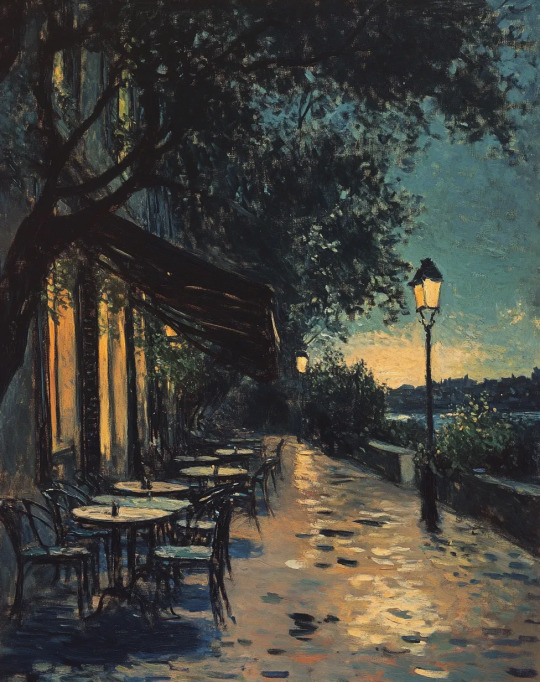
I have seen the "well real paintings have physicality this is a jpeg" discourse points and the cope couldn't be more real - 99% of art consumption in the modern world is digital or at least prints, let's get you back to bed grandma. But I did find it pretty funny that Scott noted this AI piece as one he particularly liked:
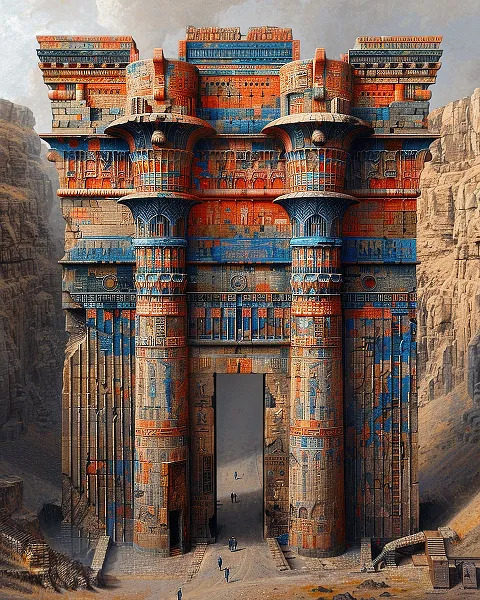
Because it is nonsensical, right? All that "faded paint", how was it originally painted - just bucket splashes of red and blue? What are those random doors, the random stairs going nowhere on the sides, the vague-nothings engravings? Scott just didn't care about that - he liked the vibe, right? Ancient ruins, epic scale. It isn't a coincidence that the Impressionist art did the best - current AI tools are always impressionist, they have an idea of the vibe and invent the details in between. In Impressionism that is the whole point.
Now the trap is to go "REAL artists can tell because of this or that" because idk, the tools might get better, they might fill in more and more details. The real revelation here is that you don't need the tools to get better - visual art isn't so different from poetry. Most people don't pay attention to it all that much. You see thousands, thousands of pieces of art a week; you probably don't even realize how many. Do you really care if the fading paint makes coherent sense on a billboard ad or a doctor's office wall painting? So much art that is made is "industrial" in this sense - it has no need to be good. Only good enough to fulfill its utilitarian role. In these fields AI absolutely is going to Take Your Jobs in some form, and already is (though imo not a ton of them). And it won't really bother most people. This can go pretty deep - I promise you people are "utilizing" AI porn right now. They are ~appreciating the details~ way more than is typical, the product is working.
All this works until it doesn't, though. When it is an art book by a favourite artist whose vision you want to pour over, learning that all the individual details were just made by AI completely defeats the purpose, right? Imagine reading a book of these poems. Outside of the novelty, "AI is the point" factor you would rather watch infomercials on repeat, I can't imagine a more pointless use of my time. "Reading arbitrary poems" is never fun, regardless of the quality of the poems. Most people don't care about poetry! The reason you care is that you care about the poet, and what they want to say. You read poetry with context, it being inserted with intent into the pages of a manga, at the end of a video game, because you like the artist and follow them on twitter. The quality of the prose isn't more important than that.
Which is a harsh limit for all of these kinds of tests. They essentially aren't testing art, right? You do not ever get paid twenty bucks to sit down and read a dozen poems and score them. That has no bearing on how you would actually ever learn to care about a poem. Which doesn't make AI art useless or anything, more that these tests will very quickly run into their limits of what they can meaningfully tell you. The actual bar is "creating something someone cares about". From that lens, I fully believe hybrid methods that privilege artistic intent are currently working and will improve. But I think for "solo" AI art getting that to work is going to be complicated.
#literary discussion#poetry kinda#also nitpicking pedantry somehow#it's been a while since I used my nitpicking pedantry tag
265 notes
·
View notes